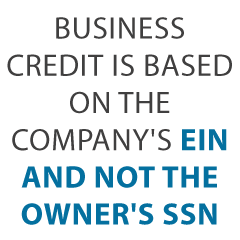- Connect With Us!
- (877) 600-2487
- info@creditsuite.com
Your Question: Does a Business Have a Credit Score?
Published By Janet Gershen-Siegel at March 27th, 2018
So, Does a Business Have a Credit Score?
Does a business have a credit score? More importantly, does your company have a business credit score? We can help you answer the question: does a business have a credit score?
You’ve probably asked this question at least once – does a business have a credit score? And are my credit ratings any good?
Let’s have a look at the bigger commercial credit reporting agencies and solve this mystery at last.
Does a Business Have a Credit Score: the Scores Business Owners Need To Know About
There are 5 business credit scores that business owners should know about.
Keeping your credit scores high is crucial, so make sure you don’t miss any of these.
Does a Business Have a Credit Score: Dun & Bradstreet’s PAYDEX
A PAYDEX Score from Dun & Bradstreet ranges from 0 to 100. This score has a basis in payment information which is on report to the bureau. Or it is on report to data-gathering companies partnering with the CRA. https://creditreports.dnb.com/m/business-glossary/paydex-score.html
D & B uses this information, along with a credit score and Financial Stress Score, so as to advise how much credit a loan provider should extend to your company.
Getting a PAYDEX Score
To get a PAYDEX score, you have to file for a D-U-N-S number by using Dun & Bradstreet’s website. The number is at no cost. Plus the CRA will require to have records of your payments with four or more vendors.
Your company’s PAYDEX score shows if your payments are normally made promptly or ahead of schedule. As you might expect, a higher number is better.
PAYDEX Score Details
The scores break down as follows:
- 80 – 100: A low risk of late payments
- 50 – 79: A medium risk of late payments
- 0 – 49: A high risk of late payments
D&B Business Credit Scores
Your business’s credit score ranges from 1 to 5. 1 is the best score. This matches your firm with various other businesses with comparable payment histories. The score demonstrates how usually those business have a tendency to pay promptly.
This information can actually aid loan providers to acknowledge your company’s standing. Yet it does not genuinely show all of the payment records from your company.
Financial Stress Score
The Financial Stress Score likewise ranges from 1 to 5. It matches your business with other companies sharing comparable financial and company qualities.
These similarities are in areas such as size or amount of time in business. This score shows how frequently those companies have a tendency to pay in a timely manner. As before, 1 is the best score. This rating is a more thorough examination of the business landscape, versus an analysis of your business’s actual payment history.
An incredible PAYDEX score for your business is 80 – 100.
Find out why so many companies are using our proven methods to improve their business credit scores.
Does a Business Have a Credit Score: Experian
Experian’s scoring system is called Intelliscore Plus. http://www.experian.com/business-information/credit-risk-management.html
What is the Intelliscore Plus Credit Score?
The Intelliscore Plus credit score is a statistically based credit-risk assessment. The crucial function of Intelliscore Plus is to help businesses, investors, and possible future loan providers make wise judgments concerning who they should or should not do business with.
Like a car dealership makes use of a consumer’s FICO score to rapidly establish just how much of a credit risk a potential customer might be, the Intelliscore Plus credit score can give understanding on how much of a credit risk a company or company owner may be.
Intelliscore Plus Credit Score Range
The Intelliscore ratings range from 1 to 100. So the higher your score, the lower your risk class. The chart below details each Intelliscore Plus credit score range as well as its associated meaning.
Score Range/Risk Class
- 76 – 100 Low
- 51 – 752 Low – Medium
- 26 – 503 Medium
- 11 – 254 High – Medium
- 1 – 105 High
Computing an Intelliscore Plus Credit Score
In the credit world, Intelliscore Plus is deemed among the most reliable tools in effectively forecasting risk. One of the ways Intelliscore Plus maintains this claim to fame is by recognizing the significant variables that show if a company is likely to pay their debts.
Though there more than 800 commercial and owner variables constituting an Intelliscore Plus credit score, the variables can be broken down into these essential elements:
Payment History
The agencies call this recency yet in the real world, it’s nothing more than your current payment status. This includes the amount of times your accounts end up being delinquent, the number of accounts that are currently delinquent, as well as your overall trade balance.
Frequency
Much like payment history, frequency represent the quantity of times your accounts have been sent to collections, the amount of liens and judgments you may have, as well as any bankruptcies connecting with your business or personal accounts.
Frequency can likewise include details connecting to your payment patterns. Were you consistently slow or tardy with payment? Did you begin paying expenses late, however over time, stopped doing so? These variables will certainly all be taken into consideration.
Monetary
This particular facet focuses on exactly how you use credit. For example, just how much of your available credit is currently in use? Do you have a high proportion of delinquent balance in comparison with your credit limits?
If you will start a company or are relatively new to this game, the listing above might appear a bit overwhelming. If you have not started or don’t have a long history of business-based deals, how will Intelliscore Plus rate you?
Intelliscore Plus takes care of these scenarios by using a “blended model” to develop your rating. This implies that they take your individual credit score into factor to consider when determining your company’s credit score.
Find out why so many companies are using our proven methods to improve their business credit scores
Does a Business Have a Credit Score: Equifax Business
The Equifax Credit Risk Score originates from a model which they use to place certain risks. Equifax uses these details in its calculations, including the depth of the credit info Experian can get the length of your business’s credit history, as well as your company’s payment delinquency history. http://www.equifax.com/business/equifax-risk-score
http://www.equifax.com/assets/USCIS/efx-00178_efx_risk_score.pdf
http://www.equifax.com/assets/USCIS/efx-00164-9-13_efx_bni.pdf
Equifax then segments some 5 different scorecards together, by using statistical analysis. In order to boost their precision, Equifax recommends incorporating their Credit Risk Score with their proprietary Equifax Bankruptcy Navigator Index.
The Bankruptcy Navigator Index helps predict the chance of your business going bankrupt in the next 24 months. Equifax bases its predictive model on over 270 million different accounts.
Equifax displays three different company determinations on its business credit reports. These are the Equifax Payment Index, your company’s Credit Risk Score, and its Business Failure Score.
Equifax Payment Index
Comparable to the PAYDEX score, Equifax’s Payment Index, which has its measurement on a scale of 100, demonstrates how many of your business’s payments were made punctually. These consist of both data from credit companies as well as vendors.
But it’s not indicated to forecast future behavior. That is what the other two ratings are for.
Equifax Credit Risk Score
Equifax’s Credit Risk Score examines just how likely it is your company will end up being severely delinquent on payments. Scores vary from 101 to 992, and they examine:
- Available credit limit on revolving credit accounts, e. g. credit cards
- Your company’s size
- Proof of any non-financial transactions (e. g. vendor billings) which are delinquent or were on charge off for two or more invoicing cycles
- Length of time since the opening of the earliest financial account
Find out why so many companies are using our proven methods to improve their business credit scores
Equifax Business Failure Score
Last but not least, Equifax’s Business Failure Score looks at the risk of your company closing. It varies from 1,000 to 1,600, assessing these aspects:
- Total balance to total current credit limit average utilization in the previous three months
- The length of time since the opening of the oldest financial account
- Your business’s worst payment status on all trades in the previous 24 months
- Documentation of any non-financial transactions (e. g. vendor invoices) which are overdue or have been on fee off for two or more billing cycles.
Equifax Scoring Analysis
For the credit risk and business failure scores, a rating of 0 means bankruptcy.
An incredible Equifax score for your business is as follows:
- Payment Index 0 – 10
- Credit Score 892 – 992
- Business Failure Score 1400 – 1600
Does a Business Have a Credit Score: FICO Business
FICO uses its SBSS (Small Business Scoring Service) Score to combine consumer bureau, economic, application, and business agency data. FICO then validates their SBSS models for purchases such as Line of Credit transactions, Term Loans, and Commercial Card obligations which go up to $1 million. Their idea is to review just how your small business pays back all types of loans. http://www.fico.com/en/node/8140?file=6045
Business credit providers use the FICO SBSS score as a device to decide whether they should authorize a loan to your small business at all.
The SBA employs this score as well, to authorize or approve company loans. It has a basis in your business and consumer credit history as well as not just your company’s financial health.
The score factors in the analysis of the risks inherent in your business’s credit applications. With SBSS, loan providers make their determinations in a matter of hours, as opposed to days. Lenders are more confident in their lending judgments, and your business gets quicker decisions on your loan applications.
The SBA’s Participation
The FICO Small Business Score or SBSS score is the key number that the SBA considers while identifying to authorize a loan, particularly when it involves the SBA’s 7(a) loans.
Computing a FICO SBSS Score
The FICO SBSS Score shows the chance or possibility of you, the candidate, covering your month-to-month costs promptly. The score ranges from 0 to 300. A higher score means lower risks and commonly produces more positive credit terms. The score originates from your company and personal history of credit use in addition to your business’s financial information. Variables also include your business’s age, as well as its years or complete time in business.
As of 2014, all SBA 7(a) loans must go through a business credit score pre-screen, as well as for SBA loans, you might potentially not get an approval if you had a score less than 140. But the cutoff was typically set to 160, and in many cases, a score below 160 meant a denial. Many lenders will only approve scores over 160 or 180, to lend up to $1 million. Yet a score lower than 160 or 180 can still qualify you for a smaller loan.
The formula for the FICO SBSS Score is as follows:
- The last year of PAYDEX scores from Dun & Bradstreet
- Amounts and types of any judgements against your company
- The amounts and kinds of any liens against your business’s real or personal property.
- Your firm’s available resources
- Your small business’s profit
- And other, less distinct financial information
If you have no document of business credit and had a small or brief time in your business, then the possible greatest FICO SBSS score you can possibly anticipate is 140.
Usage and Types of SBSS Model Lenders
A FICO SBSS score includes the choice to opt for particular models which are market-specific for enhanced and better decision making. For example, one model is an agricultural leasing and lending model. Another model was made particularly for Canada. Additionally, the insights of the SBSS score provide support for the SBRI (Small Business Risk Insight, from Dun & Bradstreet) and the SBFE (Small Business Financial Exchange) information repositories.
Verifying the SBSS models is necessary for lines of credit, industrial cards, as well as term loans of as much as one million dollars. If you are asking for one million dollars or less from bank financing, then there are chances that your SBSS score will be under review.
The Type of Information in the Score
The SBSS offers the credit providers of companies different data blends to ensure that they can assess your business’s credit risks. For example, a certain issuer of credit can select only to examine a principle proprietor’s application information, or the credit issuer can choose to include one or multiple business bureaus’ data.
Or the credit issuer can just choose to prioritize one aspect over another. This intelligent rating stems from different business agencies on an automated basis, in any order or whatever priority the issuer of the credit likes. Therefore, if the loan provider picks the score of Dun & Bradstreet’s PAYDEX as its default, the SBSS will pull that set of information.
SBSS Credit Offer Index: How It Works and Why It Is Important
The Credit Index is an element of the FICO SBSS Credit Score for your small business, made to aid credit issuers understand your capacity. It works as the requirements against all the businesses with similar profiles.
The SBSS Credit Offer Index consists of financial application info, business credit bureau documents, and credit bureau data for customer. It provides a percentile ranking of the present against other smaller sized businesses with identical or comparable features and total requested money from all those companies.
The Updated SBSS
Reporting agencies like D&B power the newer FICO SBSS Score model. The SBFE data may be used to expect charge-offs, bankruptcy, or three plus cycles past due or delinquency over a duration of two years.
Does a Business Have a Credit Score: 5. SBA Credit
The SBA’s tool has a basis in FICO. Their idea is to quicken their credit decisions for loan authorizations. The tool uses several information sources and over one hundred combinations of company and consumer analytical models. They use a designated cutoff. https://www.sba.gov/offices/district/mo/st-louis/resources/small-business-loan-credit-scoring
Their total stats on their over $60 billion portfolio show that companies with scores at, or above the assigned cut-off will have excellent payment history.
Does a Business Have a Credit Score: And if So, Exactly How Do You Make it Better?
The big question has arrived, and while there is no golden solution, these ideas can absolutely aid you improve your rating.
Make Your Payments on Time
Your payment patterns and history are a driving force in your overall credit score. Over time, paying your invoices promptly will help establish your company as one that pays their financial obligations. This will undoubtedly help push your score up as well as show other companies you are a low risk.
Keep Your Debt-to-Income Ratio in Check
The more debt you have on your plate, the more invoices you have, and the less disposable income you have. If your total debt approaches or surpasses your income level, then you’re most likely to be seen as high-risk.
Keep your financial obligations in check and regularly pay them off to keep a healthy balance between what you make and what you owe.
Use Your Credit
Keeping your financial obligations low continues to be sound advice. Still, opening and sensibly benefiting from company credit accounts can help you increase your available credit and enhance your credit rating.
Keep a Healthy Personal Credit Profile
Now, you understand that your own personal credit is fair game when it comes to your Intelliscore Plus score. Running a company is tough work, but do not let your individual finances suffer. Make sure that you remain on top of your individual monthly bills, stay clear of unnecessary credit inquiries, and refrain from compromising your personal credit for company needs.
Check Your Credit Reports
Irrespective of what your credit score is, it is vital that you continue to be thorough and review your personal and business credit reports. This can help you find possible problems and stay educated by yourself credit profile.
Does a Business Have a Credit Score: Takeaways
When you understand where to check your business credit score, you have a much better chance of getting on top of it, and staying there.

 " class="attachment-blog-single size-blog-single wp-post-image" alt="Get Business Credit Cards for New Businesses Credit Suite-Business Line of Credit Decoded" title="Get Business Credit Cards for New Businesses">>
" class="attachment-blog-single size-blog-single wp-post-image" alt="Get Business Credit Cards for New Businesses Credit Suite-Business Line of Credit Decoded" title="Get Business Credit Cards for New Businesses">>
